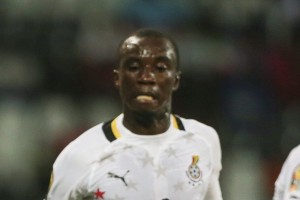Brazil 2014: Group G, Ghana

Mohammed Rabiu could be the element of surprise that will ensure the Ghanian predominance in the group, and a problem for the other, bigger, teams. (Photo: EFE/Nic Bothma )
Main profile – Mohammed Rabiu
Many people walk by Mohammed Rabiu every day in Accra without rearising who he is. That is quite an achievement in Ghana when you are member of the national soccer team, the Black Stars.
Rabui has turned being invisible into an art form even on the pitch. He is the player journalists barely waste ink on, the one coaches never plan for, often targeting Michael Essien, Sulley Muntari or any other of the “superstars” of the team. The thing is this. Rabiu is the star of the team.
The son of a local watch repairer who also doubled as the goalkeeper of the town team Konongo Golddiggers, young Rabiu and his twin Salisu lost their father at a very young age leaving their mother, a local food seller to raise five children. She wanted nothing to do with soccer and was insistent that young Rabiu stay in school to have an education so he could have a chance of a better life.
The game was in his blood even though he stayed away from playing organized school soccer because he was so shy. His talent, however, could not be ignored and a local teacher, Anthony Kofi Boakye, decided to give him a push that would lead to great things.
“Our school team was preparing for a match against the next town and I had heard of a talented 12-year-old boy in the sixth grade. I managed to convince him to join our team which comprised 15-year-olds with the plan of blooding him for the next year. After a few training sessions it was obvious he was as good as any of the first-team players we had even though he was very timid. In the game against Mampong we brought him on as a substitute and he scored the winning goal.”
Rabiu never looked back after that. He joined a local colts team, AA Missiles, and played soccer through his secondary school days at Konongo Odumase school. After school Rabiu made up his mind soccer was going to be his life and was signed by Liberty Professionals in 2007, the same team that discovered Essien, Muntari and Asamoah Gyan.
Again his shy nature meant chances were at a premium in a star-laden team but he had his moments and none more spectacular than in a cup match against the giants Accra Hearts of Oak. With no substitutions left, Liberty’s goalkeeper was sent off and Rabiu volunteered to take his place.
“I did not know why I did it but I felt I could save the penalty so I went in there.” He saved the penalty and his team would go on to win the match. However, it would be the last time he would make positive headlines as he bounced from club to club in Europe looking to make a name for himself. He passed through Gimnasia and Xerez in Spain, Sampdoria and Udinese in Italy and Evian Thonon Gaillard in France all in two and a half years. He had become a journeyman because coaches found it hard to place him. He was willing but not assertive. Others could take the glory, all he wanted was to play soccer.
In 2009 he was called up to join Ghana’s under-20 team for the World Cup in Egypt and enjoyed a stellar tournament as Ghana went on to beat Brazil in the final. He did it his own way, though, quietly and without fuss. Not many remember that he played with that squad. While some of his team-mates signed lucrative contracts with big clubs he returned to obscurity in France.
It would take another three years for him to make a return to the national picture after earning a call-up to the Black Stars squad for the African Cup of Nations in 2013. For Rabiu this was where he wanted to be. The spot where finally he could emerge and show his true worth on a truly notable platform. Drafted into the team after some poor performances from the veteran midfielder Derek Boateng, Rabiu took control as the midfield protector and never looked back. He still owns the position.
“I wanted to show coach Kwesi Appiah what I could do and he gave me the opportunity. I took my chance,” says Rabiu, for whom club recognition was also on the horizon. In the summer of 2013 with a deal to Olympiakos in Greece all but sealed, a phone call to a mentor changed his path. He was advised to choose a more lucrative deal to join the less prestigious Kuban Krasnodar in the Russian league for the sake of his family.
His friend, himself a former soccer star whose career went awry, asked him to think of his family first. They had worked hard enough and needed looking after. Kuban provided that kind of security. He listened and joined the Krasnodar-based team, where he is quietly going about his job.
Rabiu has matured incredibly since. He exudes presence when with his friends but do not expect to find him in a noisy conversation or out for a jaunt with the boys. All he cares about now is the World Cup. “I am very happy about my call-up to the Black Stars team. I want to be a part of this team for a long time. If you have a good mentality, trust yourself, do your best and pray to God, you can do your best.”
In Brazil he will still be an unknown element for most, but that is how he likes it. An element of surprise that opponents will not see coming.
Tactics/questions
The Black stars manager, Kwesi Appiah, has a disdain for systems. According to him players should be allowed to play free of tactical restraints to get the best out of them. He also believes in sticking with what works and is not known for experimentation.
In qualification for the World Cup, he stuck to the same group of players in a rigid 4-4-2; for so long Ghana have been masterful proponents of the 4-5-1. Appiah discovered the best way to get more out of his team during qualification was to give his captain and striker Asamoah Gyan some support. That came in the form of the diminutive striker Abdul Majeed Waris, whose willingness to run at defenders and take them out of position opened up space for Gyan. Nine goals were scored between the pair in qualification.
It is not certain that Appiah will continue with this gung ho approach considering the deficiencies in the team’s defense and goalkeeper, as well as the fearsome attacking talent in the Group G opponents: Portugal, Germany and USA.
The question of who starts at center-back is still up in the air with Jerry Akaminko, John Boye, Jonathan Mensah, Rashid Sumaila and Isaac Vorsah fighting for the slots.
The long-tested midfield partnership of Michael Essien and Sulley Muntari will be broken up with Mohammed Rabiu taking a defensive midfield slot to offer the energy and pace that the two experienced players can no longer provide.
Appiah’s biggest problem is at full-back. His best left-back is a right-back by trade who spends his regular season playing in midfield at Esperance, Harrison Afful, while his other options, Samuel Inkoom and Daniel Opare are nothing if not inconsistent.
Upfront, Gyan is untouchable and should receive plenty of help from Kevin-Prince Boateng in a link role while Christian Atsu patrols the flank.
Appiah has proven to be consistent with his system but the greatest advantage he brings to this team is a belief in them and an innate ability to draw the best out of unsung players.
Who is the player who is going to surprise everyone at the World Cup?
Rabiu did not play in the first two games of the qualifying series but by the end was generally heralded as the most important player in the team. The Kuban Krasnodar enforcer is 24 but has already played for six clubs. He is a tireless runner with magnificent instincts while his tackling is top notch. He offers solid protection and a platform upon which the team builds their attacks. It is no easy task to make Essien and Muntari fight for a slot but that is what he has done in a year and is one of Appiah’s most trusted players.
Who is the player who is going to disappoint the most?
Sulley Muntari. For so long an untouchable for the Black Stars, Muntari is past his peak. His trademark ferociousness is gone as has his powerful left foot. He might start all the games but if things go awry, expect Ghanaian fans to point fingers at the Milan man.
What is the realistic aim for your team at the World Cup and why?
Semi-finals. The team is full of players with points to prove and in form at the right moment. The opening game against the USA in a tough group is the most important and a positive result will embolden an already confident squad. Germany beat the African side at the last World Cup but Portugal will not beat Ghana. Outside of Group G, none of the teams on the path to the semi-finals can claim to be better than the Black Stars.
Anecdotes
Asamoah Gyan
The dancing and music-loving captain of the Black Stars is respected but there is also genuine fear and a belief that his success is not down to just his fine soccer playing skills. Why? His big brother Baffour is married to the daughter of one of Ghana’s most feared and respected spiritualists and there have been many murmurs of help from nether realms in the success of the Gyan brothers.
Samuel Inkoom
The Dnipro right-back shot to fame in a manner not many soccer players can lay claim to. He was called out live on radio by his alleged “baby mama” when he was 18 and accused of neglecting his baby. Suffice to say he did not take kindly to the claims and denied knowledge of the accusation. Inkoom is very happily married these days with a lovely family.
Christian Atsu
The on-loan Chelsea player was named Vitesse Arnhem’s player of the year but many years ago he made his way by selling ice-cold water to pedestrians in the streets of Accra to make a living. The product popularly called sachet water in Ghana was the only way the young Atsu could make a living in the capital while pursuing his soccer dreams.
Sulley Muntari
The Milan midfielder is really just a mother’s boy. His mother Hajia Kande was so interested in his career that when he played for the junior national teams, she used to cook for the entire team any time she had to visit her son in camp. She also once called the entire country jealous of her son on national radio and declared openly “No Sulley Muntari, No Black Stars”. She was forced to make her apologies a few days later.
Michael Essien
What’s the biggest gift you ever gave an ex-girlfriend? Michael Essien gave his former fiancée his house after they broke up. She showed her appreciation by turning it into a local restaurant, one that is still in operation.





